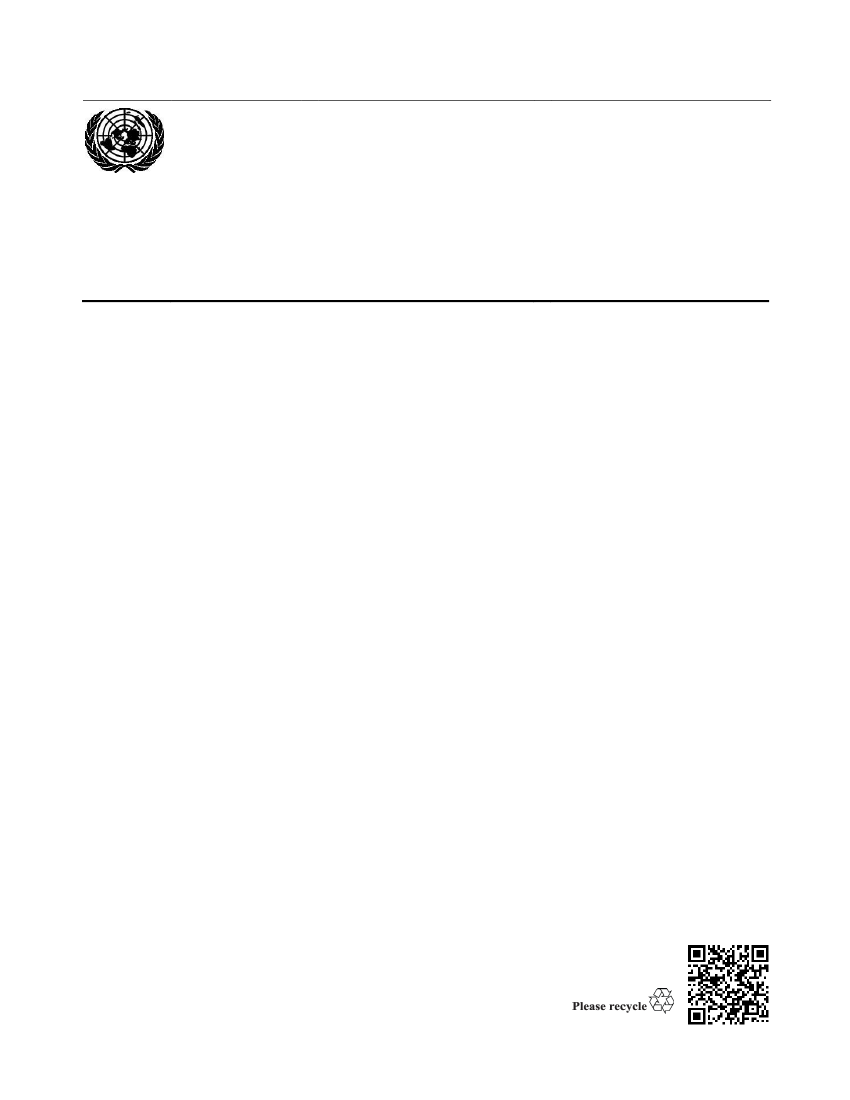Forsvarsudvalget 2013-14
FOU Alm.del Bilag 95
Offentligt
United Nations
S/RES/2149 (2014)Distr.: General10 April 2014
Security Council
Resolution2149 (2014)Adopted by the Security Council at its 7153rd meeting, on10 April 2014The Security Council,Recallingits previous resolutions and statements on the Central AfricanRepublic (CAR), in particular resolutions2121 (2013), 2127 (2013)and2134(2014),Reaffirmingits strong commitment to the sovereignty, independence, unity andterritorial integrity of the CAR, and recalling the importance of the principles ofnon-interference, good-neighbourliness and regional cooperation,Reaffirmingthe basic principles of peacekeeping, including consent of theparties, impartiality, and non-use of force, except in self-defence and defence of themandate, andrecognizingthat the mandate of each peacekeeping mission is specificto the need and situation of the country concerned,Expressingdeep concern at the security situation in the CAR,Recallingthat the Transitional Authorities have the primary responsibility toprotect the population in the CAR,Emphasizingthat any sustainable solution to the crisis in the CAR should beCAR-owned, including the political process, and should include the restructuring ofthe Central African security forces,Further emphasizingthat the continued role of the region, including the Chairof ECCAS and its Mediator, as well as the AU, will be critical for the promotion oflasting peace and stability in the CAR,Welcomingthe positive and decisive impact of MISCA’s actions on the groundin protecting civilians and preventing serious violations of international law, and theprogress made in the implementation of other aspects of its mandate as reflected inthe first progress report of the AU Commission on the deployment and operations ofMISCA submitted pursuant to paragraph 32 of resolution2127 (2013),Remaining seriously concernedby multiple violations of internationalhumanitarian law and the widespread human rights violations and abuses, includingthose involving extrajudicial killings, enforced disappearances, arbitrary arrests anddetention, torture, sexual violence against women and children, rape, recruitment
14-29581 (E)
*1429581*
S/RES/2149 (2014)
and use of children and attacks against civilians, in particular but not limited toMuslims, and attacks against places of worship, denial of humanitarian access,committed by both former Seleka elements and militia groups, in particular the“anti-Balaka”,Condemningin the strongest terms all the attacks and provocations againstMISCA contingents by armed groups and urging the CAR Transitional Authoritiesto take all possible measures to ensure the arrest and prosecution perpetrators,Stressingthe urgent and imperative need to end impunity in the CAR and tobring to justice perpetrators of violations of international humanitarian law and ofabuses and violations of human rights,underliningin this regard the need to bolsternational accountability mechanisms andunderliningits support for the work of theIndependent Expert on human rights in the CAR and of the InternationalCommission of Inquiry,Reiteratingthat all perpetrators of such acts must be held accountable and thatsome of those acts may amount to crimes under the Rome Statute of theInternational Criminal Court (ICC), to which the CAR is a State party, and furtherrecallingthe statement made by the Prosecutor of the ICC on 7 August 2013 and9 December 2013 andnotingthe decision made by the Prosecutor of the ICC on7 February 2014 to open a preliminary examination on the situation in the CARsince September 2012,Emphasizingthe risk of the situation in the CAR providing a conduciveenvironment for transnational criminal activity, such as that involving armstrafficking and the use of mercenaries as well as a potential breeding ground forradical networks,Acknowledgingin this respect the important contribution the Council-mandated arms embargo can make to countering the illicit transfer of arms andrelated materiel in the CAR and its region, and in supporting post -conflictpeacebuilding, disarmament, demobilization and reintegration and security sectorreform, andrecallingits resolution2127 (2013)and expressing grave concern at thethreat to peace and security in the CAR arising from the illicit transfer, destabilizingaccumulation and misuse of small arms and light weapons,Recallingits decision to establish a sanctions regime pursuant to resolutions2127 (2013)and2134 (2014)andemphasizingthat the targeted sanctions aim at,inter alia, individuals and entities designated by the Committee as engaging in orproviding support for acts that undermine the peace, stability or security of theCAR, that impede the political transition process or that fuel vio lence and atindividuals and entities designated by the Committee as involved in planning,directing, or committing acts that violate international human rights law orinternational humanitarian law or that constitute human rights abuses or violations,Reiteratingits serious concern at the dire humanitarian situation in the CAR,and emphasizing in particular the humanitarian needs of the more than 760,000internally displaced persons and of the more than 300,000 refugees in neighbouringcountries, a large number of which are Muslim, and furtherexpressingconcern atthe consequences of the flow of refugees, on the situation in Chad, Cameroon andthe Democratic Republic of the Congo, as well as other countries of the region,
2/14
14-29581
S/RES/2149 (2014)
Expressing concernat the collapse of the already fragile administration whichlimits the ability of the new Transitional Authorities to govern,Urgingall parties to take the necessary steps to ensure the safety and securityof humanitarian personnel, of United Nations and associated personnel and ofUnited Nations installation, equipment and goods,Reiteratingits appreciation for the ongoing efforts of the EconomicCommunity of Central African States (ECCAS) and its Mediator regarding the CARcrisis, as well as the efforts of the African Union to resolve the crisis, and the effortsof the International Contact Group on the CAR, co -chaired by the AU and theRepublic of Congo, andwelcomingthe communiqué issued at its 4th meeting heldin Brazzaville, on 21 March 2014, including the envisaged steps to enhance itseffectiveness and support to the transition in the CAR, andencouragingallstakeholders to pursue their efforts,Reaffirming its deep appreciationfor the critical role of MISCA, its troop- andpolice-contributing countries, and the French Forces to protect civilians, helpimprove the security situation immediately after the adoption of resolution2127(2013)and furtherexpressingappreciation for those partners that have providedairlift and other support to expedite the deployment of troops and improve theireffectiveness,Welcomingthe decision of the European Union, expressed at the meeting ofthe Council of the European Union held on 1 April 2014, to launch a temporaryoperation, EUFOR RCA, to support MISCA in the Central African Republic,Expressingthe need to accelerate the implementation of the political process,including on the reconciliation aspects and on the holding of free, fair, transparentand inclusive elections as soon as technically possible and no later than February2015,Welcomingthe joint action of some domestic religious leaders at the nationallevel in trying to pacify relations and prevent violence between religiouscommunities andnotingthe need to amplify their voices at the local level,Recallingthe need for an inclusive and effective disarmament, demobilizationand reintegration process (DDR) as well as repatriation (DDRR) in the case offoreign fighters while respecting the need to fight against impunity,Recallingits resolutions1265 (1999), 1296 (2000), 1674 (2006), 1738 (2006)and1894 (2009)on the protection of civilians in armed conflict, its resolutions1612(2005), 1882 (2009), 1998 (2011), 2068 (2012)and2143 (2014)on Children andArmed Conflict and its resolutions1325 (2000), 1820 (2008), 1888 (2009), 1889(2009), 1960 (2010), 2106 (2013)and2122 (2013)on Women, Peace and Securityand calling upon all parties in the CAR to engage with the Special Representative onChildren and Armed Conflict and the Special Representative on Sexual Violence inConflict,Acknowledgingthe adoption of the partnership arrangement between theAfrican Union Commission and the United Nations Office of the SpecialRepresentative of the Secretary-General for Children and Armed Conflict tomainstream child protection in the policies and operations of the African Union,signed in Addis Ababa on 17 September 2013, and of the Framework of Cooperationbetween the United Nations Office of the Special Representative of the Secretary -
14-29581
3/14
S/RES/2149 (2014)
General on Sexual Violence in Conflict and the African Union CommissionConcerning the Prevention and Response to Conflict-related Sexual Violence inAfrica adopted in Addis Ababa on 31 January 2014,Welcomingthe strong engagement of the European Union (EU) for the CAR,in particular the decision to contribute financially to the deployment of MISCAwithin the framework of the African Peace Facility, and furtherwelcomingthecontribution of the United States of America and contributions of Member States tothe United Nations Trust Fund for the support to MISCA,Welcomingthe pledges made at the High-Level Meeting on HumanitarianAction in the Central African Republic in Brussels, on 20 January 2014 andencouraging the international community to swiftly follow through on pledges tocontinue providing support in response to the humanitarian situation in CAR, and t oprepare for reconstruction with an approach linking relief, rehabilitation anddevelopment (LRRD),Welcomingthe pledges made at the Addis Ababa Donors’ Conference on1 February 2014 to support MISCA and the financial contribution made by theEconomic Community of Central African States (ECCAS) andencouragingtheinternational community to swiftly follow through on these pledges and to continueproviding support to MISCA,Calling oninternational partners to assist the Transitional Authorities inbuilding the institutional capacity of national police and customs authorities toeffectively monitor the borders and points of entry, including to support theimplementation of the measures established by paragraph 54 of resolution2127(2013)and the disarmament and repatriation of foreign armed elements,Welcomingthe World Bank’s plan for 2014 presented at the Central AfricanRepublic Peacebuilding Commission Country-Specific Configuration meeting on19 February 2014 and stronglyencouraginginternational financial institutions tocontinue to engage with the Transitional Authorities,Taking noteof the report of the visit undertaken by the Chair of CARConfiguration to Bangui (4-7 March),welcomingits continued engagement inmobilizing and sustaining the attention and commitment of partners ’ efforts as wellas the Peacebuilding Fund and furtherunderliningthe role of the PBC in supportingthe efforts of the Transitional Authorities towards national dialo gue andreconciliation process, as well as in addressing challenges facing the country,including political accompaniment, mobilization of international attention andsupport,Calling oninternational partners to provide financial contributions to supportDDR, DDRR and electoral processes,Taking noteof the letter from the Minister of Foreign Affairs of the CentralAfrican Republic dated 27 January 2014 requesting the deployment of a UnitedNations peacekeeping operation to stabilize the country and addr ess the civilianaspects of the crisis,Taking noteof the letter from the Chairperson of the African UnionCommission dated 17 February 2014 proposing a number of steps for enhancedinternational action in favour of the CAR, including the strengthening of MISCAthrough the mobilization of a more predictable and sustainable support, in order to
4/14
14-29581
S/RES/2149 (2014)
enable it to effectively implement its mandate and complete the initial stabilizationphase of the situation, with a view to facilitating broader and more sustaine dinternational engagement in particular through the deployment of a United Nationspeacekeeping operation, and furthertaking noteof the African Union Peace andSecurity Council Communique of 7 March 2014 on the achievements of MISCA andlong-term stabilization of the CAR,Welcomingthe Secretary-General’s report (S/2014/142) andnotingthat thesituation in the Central African Republic warrants a unified and integrated approach,including through a multidimensional United Nations peacekeeping operation and,furtherwelcomingits recommendations for the establishment of such an operation,Taking noteof the letter of the President of the Central African Republic to theSecurity Council dated 8 April 2014,Determiningthat the situation in the CAR constitutes a threat to internationalpeace and security in the region,Actingunder Chapter VII of the Charter of the United Nations,Political process1.Welcomesthe designation by the National Transitional Council, on20 January 2014, of Catherine Samba-Panza as the new Transitional Head of State,the appointment of Andre Nzapayeke as Transitional Prime Minister, and theformation of a Transitional Government;2.Welcomesthe important role of the region through the active leadershipof the Economic Community of Central African States (ECCAS), in particular themediation by the Congo, in convening government leaders, members of the NationalTransition Council, and representatives of civil society from the CAR fordiscussions hosted by the Government of Chad, in its capacity as chair of ECCAS,in N’Djamena on 9 and 10 January 2014, on the political transition in CAR, andduring which the then leaders of the transitional government resigned, andencouragesECCAS, through its Chairperson and its Mediator to continue to playthe role expected of it in the international support to the political process in theCAR;3.Reiteratesits support for the Libreville Agreements of 11 January 2013,the N’Djamena Declaration of 18 April 2013 and the Constitutional Charter for theTransition of 18 July 2013;4.Commendsthe initial measures taken by the AU and the ECCAS torestore peace and stability in the CAR;5.Underlinesthe importance of preserving the unity and territorial integrityof the CAR;6.Demandsthat all militias and armed groups put aside their arms, cease allforms of violence and destabilizing activities immediately and release children fromtheir ranks;7.Welcomesthe Secretary-General’s call for the revitalization andacceleration of the political and reconciliation process in order to lay the ground foran end to the conflict, in this regardcalls onthe Transitional Authorities todemonstrate their commitment to this process and to take concrete st eps in this
14-29581
5/14
S/RES/2149 (2014)
regard and furtherunderlinesthe importance of civil society in the revitalization ofthese processes;8.Urgesin this regard the Transitional Authorities to accelerate thepreparations in order to hold free, fair, transparent and inclusive presidential andlegislative elections no later than February 2015 and to swiftly initiate thesignificant preparations and concrete measures necessary in this regard, includingthe urgent convening of a Conciliation framework in line with the communiqué o fthe ECCAS summit of January 2014, the launching of an inclusive political dialogueon the electoral framework and the completion of the technical and legal framework,andemphasizesthat elections should include IDPs and CAR refugees, the return ofwhom should be an important objective;9.Further calls onMember States, international and regional organizationsto provide rapid and tangible support to the Transitional Authorities of the CARincluding contributions for the payment of salaries and other n eeds of theTransitional Authorities of the CAR;10.Encouragesthe Transitional Authorities with the support of key membersof the International Contact Group to take immediate measures to revitalize thepolitical process by agreeing on certain key parameters, which could include thepossible creation of an international mechanism which would include keystakeholders, including the AU, ECCAS, the United Nations and the EU, as well asthe International Financial Institutions (IFIs) as appropriate, to accom pany thetransition while respecting the sovereignty of the CAR, andrequeststhe Secretary-General to report to the Council on progress taken in this regard;11.Encouragesthe Transitional Authorities, with the support of theinternational community, in particular with IFIs leading international efforts, toestablish, based on critical peace and State building goals, mechanisms to strengthenpublic financial management and accountability, including revenue collection,expenditure controls, public procurement and concession practices building onrelevant international experiences and in a manner that fosters national ownershipand respects the sovereignty of the CAR;12.Reiteratesthat all perpetrators of violations of international humanitarianlaw and human rights violations and abuses must be held accountable and that someof those acts may amount to crimes under the Rome Statute of the InternationalCriminal Court (ICC), to which the CAR is a State party,recallsthe statementsmade by the Prosecutor of the ICC on 7 August 2013 and 9 December 2013,notesfurther the opening of a preliminary examination by the Prosecutor of the ICC onalleged crimes committed in the CAR since September 2012, andwelcomesthecooperation by the Transitional authorities in this regard;13.Calls uponall parties to armed conflict in the CAR, including formerSeleka elements and anti-Balaka elements, to issue clear orders prohibiting allviolations and abuses committed against children, in violation of applicableinternational law, including those involving their recruitment and use, rape andsexual violence, killing and maiming, abductions and attacks on schools andhospitals and furthercalls uponthe Transitional Authorities to make and implementspecific commitments on timely investigation of alleged violations and abuses inorder to hold perpetrators accountable and to ensure that those responsible for suchviolations and abuses are excluded from the security sector;
6/14
14-29581
S/RES/2149 (2014)
14.Reiteratesits demands that all parties protect and consider as victimsthose children who have been released or otherwise separated from armed forcesand armed groups, and emphasizes the need to pay particular attention to theprotection, release and reintegration of all children associated with armed forces andarmed groups;15.Calls uponall parties to armed conflict in the CAR, including formerSeleka and anti-Balaka elements, to issue clear orders against sexual and genderbased violence, and further calls upon the Transitional Authorities to mak e andimplement specific commitments on timely investigation of alleged abuses in orderto hold perpetrators accountable, in line with its resolutions1960 (2010)and2106(2013),and to facilitate immediate access for victims of sexual violence to availableservices;Transition to a PKO16.Notesthe call made by the Secretary-General in favour of increasedsupport to MISCA, in particular increased capacity for air and ground mobility,information and communication systems, intelligence capacity, medical facilitiesand logistics supply and sustainment, including the urgent provision of vitalenablers, and in favour of continued improvement of command and controlmechanisms of international forces operating in the CAR;17.Welcomesthe Secretary-General’s call for an increase in the number oftroops on the ground and in this regardwelcomesthe announcement by theGovernment of France on 14 February 2014 to increase the number of French troopsand their subsequent deployment, the decision taken by the AU PSC on 21 March2014 to authorize the deployment of additional police personnel and specializedcapabilities and the steps being taken for the early i mplementation of this decisionas well as the contributions made by Member States of the European Union, whichhave resulted in the decision of the Council of the European Union held on 1 April2014 to launch EUFOR RCA;PKO18.Decidesto establish the United Nations Multidimensional IntegratedStabilization Mission in the Central African Republic (MINUSCA) as of the date ofadoption of this resolution and for an initial period until 30 April 2015;19.Requeststhe Secretary-General to subsume the presence of the UnitedNations Integrated Peacebuilding Office in the Central African Republic (BINUCA)into MINUSCA as of the date of the adoption of this resolution and to ensure aseamless transition from BINUCA to MINUSCA;20.Decidesthat, as from 15 September 2014, MINUSCA will initiallycomprise up to 10,000 military personnel, including 240 military observers and 200staff officers and 1,800 police personnel, including 1,400 formed police unitpersonnel and 400 individual police officers, and 20 corrections officers,calls uponMember States to provide troops and police with adequate capabilities andequipment in order to enhance the capacity of MINUSCA to operate and dischargeits responsibilities effectively andrequeststhe Secretary-General to recruit qualifiedstaff, who have the competencies, education, work experience and language skillsappropriate to the tasks defined under applicable competency areas in paragraphs 30
14-29581
7/14
S/RES/2149 (2014)
and 31 below, bearing in mind the need to convey information and provide tec hnicalassistance in the most accessible manner to the desired audience;21.Further decidesthat the transfer of authority from MISCA to MINUSCAwill take place on 15 September 2014 and that, in the period from the adoption ofthis resolution to this transfer of authority, MINUSCA will implement the tasksmandated in paragraphs 30 and 31 below through its civilian component, whileMISCA will continue to implement its tasks as mandated by resolution2127 (2013)and that, on 15 September 2014, MINUSCA shall commence the immediateimplementation, through its military and police components, of the tasks mandatedin paragraphs 30 and 31 below;22.Requeststhe Secretary-General to include in MINUSCA as many MISCAmilitary and police personnel as possible and in line with United Nations standards,in close coordination with the AU and ECCAS and as of 15 September 2014, inaccordance with the Secretary-General’s Policy on human rights screening of UnitedNations personnel;23.Authorizesthe Secretary-General, without prejudice to paragraph 18above, to deploy to MINUSCA before 15 September 2014 military enablers,including military enablers transferred from other, downsizing peacekeepingoperations and through intermission cooperation, as may be necessary in order tostand up MINUSCA’s military and police components and enable them toimmediately commence the discharge of their mandated tasks on 15 September 2014and furtherrequeststhe Secretary-General to contract enablers to the same effect;24.Requeststhe Secretary-General to take all possible steps, includingthrough the full use of existing authorities and at his discretion, to accelerate thedeployments of MINUSCA’s civilian and military capabilities in the CAR, in orderto best respond to the Council’s expectations and the needs of the CAR populationandrequeststhe Secretary-General to take the necessary steps to have MINUSCAready to commence its activities;25.Requeststhe Secretary-General to transfer the Guard Unit, in line with itsoriginal mandate approved by the letter of the President of the Security Councildated 29 October 2013, from BINUCA to MINUSCA from the date of adoption ofthis resolution until 15 September 2014, anddecidesthat as of the date of theadoption of this resolution until 15 September 2014, the mandate of the Guard Unitas approved in that letter shall remain unchanged;26.Requeststhe Secretary-General, in close coordination with the AU, todeploy a transition team to set up MINUSCA and prepare the seamless transition ofauthority from MISCA to MINUSCA by 15 September 2014 and to take necessarysteps to prepare and position MISCA, as soon as possible, for its re -hatting to aUnited Nations Peacekeeping operation;27.Requeststhe Secretary-General, after a joint mission with the AU, toupdate the Security Council no later than 15 August 2014 on the state of preparationfor a seamless transition of authority from MISCA to MINUSCA by 15 September2014;28.Requeststhe Secretary-General to appoint a Special Representative forthe Central African Republic and Head of Mission of MINUSCA, who shall, from
8/14
14-29581
S/RES/2149 (2014)
the date of appointment, assume overall authority on the ground for the coordinationof all activities of the United Nations system in the Central African Republic;29.AuthorizesMINUSCA to take all necessary means to carry out itsmandate, within its capabilities and its areas of deployment;30.Decidesthat the mandate of MINUSCA shall initially focus o n thefollowing priority tasks:(a)Protection of civilians(i) To protect, without prejudice to the primary responsibility of the CentralAfrican Republic authorities, the civilian population from threat of physicalviolence, within its capabilities and areas of deployment, including throughactive patrolling;(ii) To provide specific protection for women and children affected by armedconflict, including through the deployment of Child Protection Advisers andWomen Protection Advisers;(iii) To identify and record threats and attacks against the civilian population,including through regular interaction with the civilian population and workingclosely with humanitarian and human rights organizations;(iv) To design, implement and deliver, in close consultation wi thhumanitarian and human rights organizations and other relevant partners, amission-wide protection strategy;(b)Support for the implementation of the transition process, including efforts in favourof the extension of State authority and preservation of territorial integrity(i) To take a leading role in international efforts to assist the TransitionalAuthorities working with ECCAS, the African Union, relevant stakeholdersand the international community to devise, facilitate, coordinate and provid etechnical assistance to the political transition and electoral processes;(ii) To provide good offices and political support for the efforts to addressroot causes of the conflict and establish lasting peace and security in the CAR;(iii) To provide appropriate support, in coordination with the TransitionalAuthorities, and based on the risks on the ground, for the provision of securityfor key national stakeholders, including members of the TransitionalGovernment;(iv) To assist the Transitional Authorities in mediation and reconciliationprocesses at both the national and local levels, working with relevant regionaland local bodies and religious leaders, including through inclusive nationaldialogue, transitional justice and conflict-resolution mechanisms, whileensuring the full and effective participation of women;(v) To devise, facilitate and provide technical assistance to the electoralprocess and make all necessary preparations, in support of the TransitionalAuthorities and working on an urgent basis with the National ElectoralAuthority, for the holding of free, fair, transparent and inclusive elections,including the full and effective participation of women at all levels and at an
14-29581
9/14
S/RES/2149 (2014)
early stage, and the participation of CAR IDPs and refuge es no later thanFebruary 2015,(vi) To promote and support the rapid extension of State authority;(c)Facilitate the immediate, full, safe and unhindered delivery of humanitarian assistanceTo contribute, including through effective civil-military coordination and in closecoordination with humanitarian actors, to the creation of a secure environment forthe immediate, full, safe and unhindered, civilian-led delivery of humanitarianassistance, in accordance with United Nations guiding humanitarian p rinciples andrelevant provisions of international law, and for the voluntary safe, dignified andsustainable return of internally displaced persons and refugees in close coordinationwith humanitarian actors;(d)Protection of the United NationsTo protect the United Nations personnel, installations, equipment and goods andensure the security and freedom of movement of United Nations and associatedpersonnel;(e)Promotion and protection of human rights(i) To monitor, help investigate and report publicly and to the SecurityCouncil on violations of international humanitarian law and on abuses andviolations of human rights committed throughout the CAR, in particular bydifferent armed groups, including the former Seleka and the anti -Balaka, andto contribute to efforts to identify and prosecute perpetrators, and to preventsuch violations and abuses, including through the deployment of human rightsobservers;(ii) To monitor, help investigate and report specifically on violations andabuses committed against children as well as violations committed againstwomen, including all forms of sexual violence in armed conflict, and tocontribute to efforts to identify and prosecute perpetrators, and to prevent suchviolations and abuses;(iii) To support the International Commissionimplementation of its recommendations;ofInquiryandthe
(iv) To assist the CAR authorities in the effort to protect and promote humanrights;(f)Support for national and international justice and the rule of law(i) To support and work with the Transitional Authorities to arrest and bringto justice those responsible for war crimes and crimes against humanity in thecountry, including through cooperation with States of the region and the ICC;(ii) To help build the capacities, including through technical assistance, ofthe national judicial system, and of the national human rights institutions andassist with national reconciliation efforts, coordinating with the IndependentExpert as appropriate;
10/14
14-29581
S/RES/2149 (2014)
(iii) To provide support and to coordinate international assistance to thepolice, justice and correctional institutions to reinstate the criminal justicesystem, within the framework of the United Nations global focal point on ruleof law, including through assistance in the maintenance of public safety andbasic law and order, in a manner that emphasizes civilian oversight,impartiality and the protection of human rights and to support the restorationand maintenance of public safety and the rule of law including through thepresence and assistance of United Nations police authorized in paragraph 20above;(g)Disarmament, Demobilization, Reintegration (DDR) and Repatriation (DDRR)– To support the Transitional Authorities in developing and implementing arevised strategy for the disarmament, demobilization and reintegration (DDR)and Repatriation (DDRR) of former combatants and armed elements to reflectnew realities on the ground, while paying specific attention to the needs ofchildren associated with armed forces and groups, and support for therepatriation of foreign elements;– To support the Transitional Authorities in developing and implementingcommunity violence reduction programmes;– To regroup and canton combatants and confiscate and destroy, as appropriate,the weapons and ammunition of elements of personnel who refuse or fail to laydown their arms;31.Further decidesthat the mandate of MINUSCA shall include thefollowing additional tasks as conditions permit andrequeststhe Secretariat to beginplanning for these tasks:(a) support to security sector reform and vetting processes, includingthrough the provision of strategic policy advice and coordination of technicalassistance and training;(b)coordinate international assistance as appropriate;
(c) assist the Committee established pursuant to paragraph 57 of resolution2127 (2013)and the Panel of Experts established by the same resolution, within itscapabilities, including by passing information relevant to the implementation of themandate of the Committee and Panel of Experts;(d) monitor the implementation of the measures imposed by paragraph 54 ofresolution2127 (2013),in cooperation with the Panel of Experts establishedpursuant to resolution2127 (2013),including by inspecting, as it deems necessaryand when appropriate without notice, all arms and related materiel regardless oflocation and advise the Transitional Authorities on efforts to keep armed groupsfrom exploiting natural resources;(e) seize and collect arms and any related materiel the transfer of which intothe CAR violates the measures imposed by paragraph 54 of resolutio n2127 (2013)and to record and dispose of such arms and related materiel as appropriate;32.RequestsMINUSCA to coordinate its operations with those of theAfrican Union Regional Task Force on the Lord’s Resistance Army andrequests
14-29581
11/14
S/RES/2149 (2014)
MINUSCA to share relevant information with the Regional Task Force and withnon-governmental organizations involved in tackling the threat of the LRA;33.Calls uponthe Transitional Authorities and international partners a ndrelevant United Nations entities, in coordination with MINUSCA, to address theillicit transfer, destabilizing accumulation, and misuse of small arms and lightweapons in the CAR, and to ensure the safe and effective management, storage andsecurity of stockpiles of small arms and light weapons, and the collection and/ordestruction of surplus, seized, unmarked, or illicitly held weapons and ammunition,and further stresses the importance of incorporating such elements into SSR andDDR/R programmes;34.RequestsMINUSCA to take fully into account child protection as across-cutting issue throughout its mandate and to assist the Transitional Authoritiesin ensuring that the protection of children’s rights is taken into account, inter alia, inDDR and DDRR processes and in security sector reform in order to end and preventviolations and abuses against children;35.RequestsMINUSCA to take fully into account gender considerations as across-cutting issue throughout its mandate and to assist the Government of the CARin ensuring the full and effective participation, involvement and representation ofwomen in all spheres and at all levels, including in stabilization activities, securitysector reform and DDR and DDRR processes, as well as in the national pol iticaldialogue and electoral processes, through, inter alia, the provision of genderadvisers, and further requests enhanced reporting by MINUSCA to the Council onthis issue;36.RequestsMINUSCA, within its existing resources and mandate, to assistthe political efforts of the AU and ECCAS to ECCAS to support the transitionprocess, following the transfer of authority from MISCA to MINUSCA;37.Decidesthat MISCA, MINUSCA, EUFOR RCA, the AU-RTF and theFrench forces operating in the CAR are exempt from the measures imposed inparagraph 54 of resolution2127 (2013)for the implementation of their mandatesandrequeststhese forces to report on measures taken in this regard as part of theirregular reports to the Council;38.Requeststhe Secretary-General to take the necessary measures to ensurefull compliance of MINUSCA with the United Nations zero tolerance policy onsexual exploitation and abuses and to keep the Council informed if cases ofmisconduct occur, andnotesthe relevance of the guidance on contacts with personswho are the subject of arrest warrants or summonses issued by the InternationalCriminal Court;39.RequestsMINUSCA to ensure that any support provided to non-UnitedNations security forces is provided in strict compliance with the Human Rights DueDiligence Policy on United Nations support to non-United Nations security forces(HRDDP), andrequeststhe Secretary-General to include information on any suchsupport in his reports to the Council;40.Decidesthat MINUSCA may, within the limits of its capacities and areasof deployment, at the formal request of the Transitional Authorities and in areaswhere national security forces are not present or operational, adopt urgent temporar ymeasures on an exceptional basis and without creating a precedent and without
12/14
14-29581
S/RES/2149 (2014)
prejudice to the agreed principles of peacekeeping operations, which are limited inscope, time bound and consistent with the objectives set forth in paragraphs 30 (a)and 30 (f) above, to maintain basic law and order and fight impunity andrequeststhe Secretary-General to report to the Security Council any measures that may beadopted on this basis;41.Requeststhe Secretary-General and the Transitional Authorities of theCentral African Republic to conclude, within 30 days of the adoption of thisresolution, a status-of-forces agreement with regard to MINUSCA, taking intoconsideration General Assembly resolution58/82on the scope of legal protectionunder the Convention on the Safety of United Nations and Associated Personnel,anddecidesthat, pending the conclusion of such an agreement, the model status -of-forces agreement dated 9 October 1990 (A/45/594) shall apply provisionally;42.Emphasizesthe need for MISCA, EUFOR RCA and the French forcesoperating in the CAR, while carrying out their mandate, to act in full respect of thesovereignty, territorial integrity and unity of CAR and in full compliance withapplicable international humanitarian law, human rights law and refugee law andrecalls the importance of training in this regard;MINUSCA Freedom of movement43.Urgesall parties in the CAR to cooperate fully with the de ployment andactivities of MINUSCA, in particular by ensuring its safety, security and freedom ofmovement with unhindered and immediate access throughout the territory of theCentral African Republic to enable MINUSCA to carry out fully its mandate;44.Calls uponMember States, especially those in the region, to ensure thefree, unhindered and expeditious movement to and from the CAR of all personnel,as well as equipment, provisions, supplies and other goods, including vehicles andspare parts, which are for the exclusive and official use of MINUSCA;Humanitarian access45.Demandsthat all parties allow and facilitate the full, safe, immediate andunhindered access for the timely delivery of humanitarian assistance to populationsin need, in particular to internally displaced persons, throughout the territory of theCAR, in accordance with the United Nations guiding principles of humanitarianassistance and relevant provisions of international law;Humanitarian appeal46.Welcomesthe Humanitarian appeal, regrets its insufficient currentfunding, and calls on Member States and international and regional organizations torespond swiftly to this appeal through increased contributions and to ensure that allpledges are honoured in full;French Forcesofoftoof47.AuthorizesFrench forces, within the limits of their capacities and areasdeployment, from the commencement of the activities of MINUSCA until the endMINUSCA’s mandate as authorized in this resolution, to use all necessary meansprovide operational support to elements of MINUSCA from the date of adoptionthis resolution, at the request of the Secretary-General andrequestsFrance to
14-29581
13/14
S/RES/2149 (2014)
report to the Council on the implementation of this mandate as of 15 September2014 and to coordinate its reporting with that of the Secretary-General referred to inparagraph 40 of this resolution;Reporting48.Recallsits presidential statement of 5 August 2009 by which the SecurityCouncil requested that where a new peacekeeping mission is propo sed, or wheresignificant change to a mandate is envisaged, an estimate of the resourceimplications for the Mission be provided to the Security Council;49.Welcomesthe Secretary-General’s recommendation that the objectivesand priorities of a United Nations operation, and hence its configuration, activitiesand related resources, should be adjusted over time to the situation on the groundandrequestsin this regard the Secretary-General, in his first report to the Council,to update the Council on the Mission Concept, including a concept of operations andbenchmarks for the sequencing of the mandate, and on an exit strategy, which willbe developed following the adoption of this resolution, including by providing thenecessary financial information, and the implementation of which will be monitoredby the Council;50.Requeststhe Secretary-General to keep the Council regularly informed ofthe situation in the Central African Republic and the implementation of the mandateof MINUSCA, to report to the Council, on 1 August 2014, and then every fourmonths from that date and to include in his reports to the Council updates on andrecommendations related to the dynamic implementation MINUSCA’s mandatedtasks, including by providing appropriate financial information, information on thesecurity situation, the priority political elements as defined above on politicalprogress, progress on mechanisms and capacity to advance governance and fiscalmanagement, relevant information on the progress, promotion and pr otection ofhuman rights and international humanitarian law as well as a review of the troop andpolice levels, force and police generation and deployment of all MINUSCA’sconstituent elements;51.Decidesto remain actively seized of the matter.
14/14
14-29581














